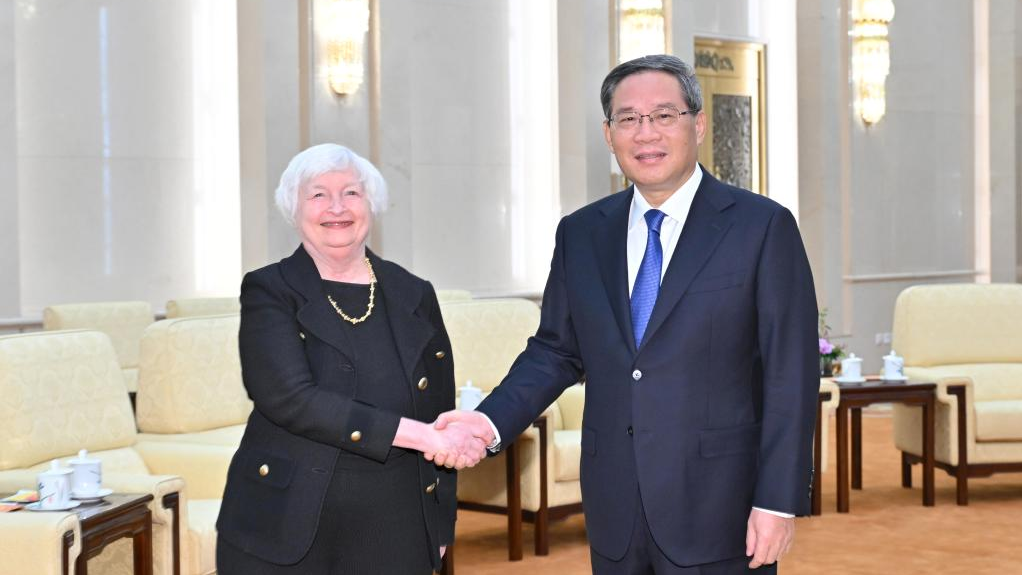By Imran Khalid
For obvious reasons, despite the lack of any tangible breakthroughs on the main contentious issues, U.S. Treasury Secretary Janet Yellen's four-day visit to China is still seen as a positive development in Sino-U.S. relations.
Even prior to her visit, both sides maintained a pragmatic stance and refrained from making any optimistic claims about its outcome. However, amidst tense Sino-U.S. relations, Yellen's visit, following the recent visit by U.S. Secretary of State Antony Blinken to China, has signaled a promising trajectory of renewed communication channels between the two countries. Throughout her visit, which involved a long string of meetings and negotiations with business leaders and top policy makers of China — including Chinese Premier Li Qiang, Chinese Vice Premier He Lifeng, and the governor of the People's Bank of China, Yi Gang — showed a relatively conciliatory tone in every interaction with the Chinese leadership.
"I am in Beijing to build on that direction … It is my hope that this visit can spur more regular channels of communication between our two countries … We seek healthy economic competition that is not winner-take-all but that, with a fair set of rules, can benefit both countries over time," remarked Yellen. She repeatedly talked about a "healthy economic competition" which is certainly encouraging, especially when contrasted with the frequently biased and bullying rhetoric directed at China from Capitol Hill. Unlike some of her hawkish peers in Washington, Yellen displayed a somewhat practical approach towards China. Her statements opposing "decoupling" from China and advocating for "necessary" and "constructive" economic relations reflect her differing approach.
China-U.S. relations have faced significant challenges in recent times, characterized by escalating tensions across various fronts, including trade, tariffs, and technological competition. Given the strained state of affairs, it is imperative for both of the countries to approach these issues cautiously, prioritizing the restoration of stability, enhancing productive dialogue, and identifying areas of mutual interest and global importance. One contentious issue is regarding the United States' additional tariffs on China, and the possibility of their cancellation. Additionally, the U.S.' possible withdrawal of the "Section 301 investigation" against China also warrants careful consideration. Equally important is the possible review of the phase-one economic and trade agreement, necessitating a comprehensive assessment of its implementation.

Chinese Premier Li Qiang (right) meets with U.S. Treasury Secretary Janet Yellen (left) at the Great Hall of the People in Beijing, capital of China, July 7, 2023. [Photo/Xinhua]
During this visit, Yellen's defense of the "targeted actions" carried out by the United States appeared quite feeble. Yellen's claim that these measures are solely motivated by national security concerns is very superficial and misleading. It is evident that the U.S. is resorting to underhanded tactics to impede China. The American policy-makers fear China's rapid development and seek to curb its influence by stifling its access to essential technologies. This deliberate maneuvering only serves to perpetuate a one-sided power dynamic that favors the U.S.
Nonetheless, Yellen's visit to China falls in line with the broader China policy of the Joe Biden administration, indicating no immediate shift in Washington's stance on China. Expectations for a substantial adjustment in American stance stemming from Yellen's visit appear challenging.
While Yellen's visit holds symbolic importance, the underlying dynamics of the relationship necessitate a broader and sustained effort from both sides to explore avenues for constructive engagement and potential areas of cooperation amidst enduring disagreements and tensions. Amidst the evolving dynamics of the China-U.S. relationship, Yellen's visit carries the prospect of enhancing a more constructive path forward. By maintaining a focus on cooperation rather than confrontational approaches, it is possible to create a foundation for a more rational and balanced China policy in Washington.
It is important to analyze the multifaceted messages emanating from Washington. By earnestly engaging in these discussions, both China and the United States can pave the way for a more constructive and mutually beneficial trade relationship that aligns with their respective interests and promotes global economic stability.
However, it is important to note that neither side has expressed a desire to sever economic ties or pursue a complete decoupling of their respective economies. Both parties are aware of the mutual dependence that exists and understand the necessity for cooperation on various international and global matters. They are keen to avoid an all-out diplomatic confrontation that could jeopardize their ability to collaborate effectively. Despite the tensions, there remains a shared recognition that maintaining a degree of cooperation is crucial for addressing the complex challenges.
Climate change presents a vital opportunity for both nations to collaborate, establishing a foundation of trust that can extend to broader engagement across economic and political spheres. By uniting efforts to combat this global challenge, China and the United States can foster a platform for mutual understanding and cooperation. The upcoming visit of U.S. Special Presidential Envoy for Climate John Kerry, is poised to further enhance the positive momentum generated by Yellen's recent visit.
Imran Khalid, a special commentator on current affairs for CGTN, is a freelance columnist on international affairs.

 中文
中文



